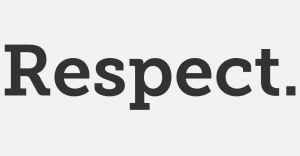In the August 5, 2014 Ask The Headhunter Newsletter, a headhunter’s troubles reveal how job seekers can help themselves:
I just read your expose on CareerBuilder (Employment In America: WTF is going on?). I have used them over the years with very mixed results, and now they’re eliminating my discount and almost doubling my cost. A major disappointing rip-off.
I am a niche technical recruiter in a sector that has thousands of jobs not being filled because there is a lack of heavy-industry engineers. I am on Linkedin with up to 14 million connections to the 3rd level. There are some legit contacts, but the recruiter tools are a rip-off. And like CB and Monster, their sales people are relentless and care little for their customers’ results.
I have been doing direct e-mail campaigns and making calls, and I’ve been posting to niche boards. I got slammed by junk resumes on Indeed. Monster wants to sell me a $5,000 per month program, and I am hitting the wall. I have used some professional sourcers and it has been a struggle. One sourcer’s fee would be 50% of the fee a client would pay me.
I am floundering. All the techie features of these online systems can be a distraction! What else can I do to find good candidates for my clients? This is still about finding good people for good companies. Part of the problem is that the people I am searching for in heavy industry don’t publish, don’t attend conferences and don’t operate or participate on blogs. The companies that I work for trust me and they know their positions need to be filled with leprechauns riding unicorns chasing purple squirrels. Nick. I don’t want to be a lousy recruiter. It is still an important service that changes lives… hopefully for the better. Any advice is appreciated.
Nick’s Reply
I hope job seekers, whose questions we usually discuss here, can learn something from my advice to a troubled headhunter.
The solution is old-fashioned. You have to go where these people (candidates) hang out — wherever that might be. You talk to people who know people in the business – and ask for referrals to other possible sources. You do this primarily on the phone, but as much as necessary by e-mail, too. The point is to create a potent network of solid contacts so that insiders in heavy industry will know who you are and refer others to you.
LinkedIn is little more than a fancy phone book. Everyone is in it, but consulting it isn’t recruiting. As you can see, a list of 14 million people and their data is useless in itself. And the job boards deliver swill by the bucket. The reason a company uses a headhunter like you is that this takes hard work and there are no shortcuts. That’s where the huge headhunter fees originated – for all the hard work. Those professional “sourcers” you mentioned — they actually identify appropriate candidates in very challenging industries, and that’s more than half the work of headhunting. Of course they want half your fee! The online shortcuts just don’t do it.
I’m not trying to give you a hard time, just a reality check. Headhunting is 90% meeting and talking with people all day long. That’s where assignments and candidates come from. I know you know this, or you wouldn’t be telling me how all these “services” don’t really work.
You can start with your clients. Meet with them and ask them where their best hires have come from – what cities, what companies, what schools, where? Then I’d start cultivating contacts in those places.
Then go to heavy-industry engineers you have placed. What competing or related companies do they admire? Do they know engineers there? What continuing education courses do they take and where? Sign up for some of those classes — it’s where you’ll meet engineers and sources of good contacts. What conferences do they attend? Attend them yourself. (I don’t buy what you’re saying. Engineers congregate with other engineers. Your challenge is to figure out where.) Don’t just talk to attendees; talk to the organizers and presenters. They are great sources of candidates. Just don’t forget to return favors!
I’m sure you know people in manufacturing, finance, operations, marketing and sales. Many of them know engineers who know the engineers you’re looking for. That’s who those “sourcers” are talking to. Your job is to talk to them, too.
For the job seeker
Networking is not about using people. It’s about hanging out with the people you want to work with, where they hang out — talking shop, contributing to your professional community and making friends. The How Can I Change Careers? Answer Kit (36 pp., PDF format) provides tips and tools for career changers and job changers alike, including:
- A good network is a circle of friends
- The basics of good networking
- How to initiate insider contacts
- Tell me who your friends are
- PLUS: Create your next job
- PLUS: Put a free sample in your resume
- PLUS: A crib sheet to help you explore, choose and research the right opportunities; tips on how to enter a circle of friends; how to define an employer’s needs and map your skills; and how to create a business plan for a job that will make you the profitable candidate in an interview.
I’m also sure you know quite a few heavy-industry engineers who are not looking to make a change. Buy them a nice lunch anyway and pick their brains — express an actual interest in their work. Become more of an expert in the field you recruit in, and you will start to see connections and opportunities you never saw before. Don’t ask these engineers for referrals; instead, offer them introductions to other people that might be beneficial. For free. Become a hub of good contacts without expecting any return and those engineers will start referring their friends to you because they will come to see you as more than just another headhunter who throws buzz words around — they’ll see you as a valuable industry resource.
For the job seeker
The best headhunters are looking for you in places where the best of your peers are talking shop. They cultivate potent networks of solid contacts — and job seekers can do exactly the same for themselves. For a more structured approach to how job seekers can meet and work with the best headhunters, see How to Work With Headhunters… and how to make headhunters work for you (130 pp., PDF format). It includes these sections and much more:
Why don’t headhunters return my calls?
- How should I judge a headhunter?
- What are all the different kinds of headhunters?
- Are online job boards a good way to find headhunters?
- What’s the secret to getting on a headhunter’s list?
- What kind of resume will make me the headhunter’s #1 candidate?
- How can I find a good headhunter?
- How should I manage a call from a headhunter?
- Should I divulge my salary to a headhunter?
- How should I negotiate with a headhunter?
- Can I boost the salary range for a job?
- Can a headhunter hurt my reputation?
- Should I tell a headhunter who else I’m interviewing with?
- PLUS: How do I keep a headhunter from squeezing me out of negotiations?
- PLUS: How do I avoid having my resume tossed in the trash?
Like good jobs, good candidates are found through relevant contacts and hard work. (Who is relevant depends on how creative and insightful you are. That’s another thing that makes those big headhunter fees hard to come by.) The contacts you need will grow out of your active participation in the professional community you recruit from.
I admire how seriously you take your work. But no one is going to do it for you, and no online service will replace you. Take that to the bank.
How do the best headhunters you’ve met operate? We’re always talking about what’s wrong with headhunters. Some of them are very good at what they do. What’s right about them? Please share your experiences. Let’s talk about how to use the best headhunters’ best methods yourself!
: :


 I think it’s bulltarkus. Any company that asks you to do an interview by yourself on video might as well hire an inflatable doll. If an employer asks you to invest your time to apply for a job while it avoids investing time in you, think twice before doing it.
I think it’s bulltarkus. Any company that asks you to do an interview by yourself on video might as well hire an inflatable doll. If an employer asks you to invest your time to apply for a job while it avoids investing time in you, think twice before doing it.
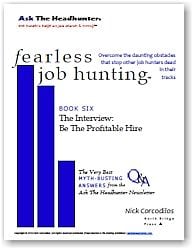
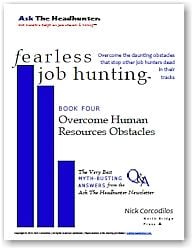
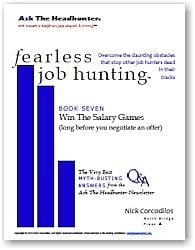
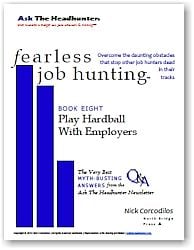

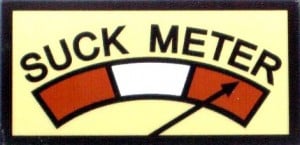 You’re opening up a can of worms. So let’s tie on our aprons and take a good look at the slop that passes for “recruiters” nowadays.
You’re opening up a can of worms. So let’s tie on our aprons and take a good look at the slop that passes for “recruiters” nowadays. andscape is littered with the corpses of brilliant, “award-winning” referral services: refer.com, KarmaOne, YorZ, h3.com, referrio.com, and more.
andscape is littered with the corpses of brilliant, “award-winning” referral services: refer.com, KarmaOne, YorZ, h3.com, referrio.com, and more.
 “Second, the best headhunters will not invest their valuable time to get partial fees. They’ll go work on real assignments, where the client wants the best candidates and is willing to work closely with one headhunter – even if only on contingency — who will earn a full fee. Key here is the fact that you’re not lowering the fee the client is paying – just distributing it. There’s no benefit to the client. Having ‘more headhunters’ working on an assignment has never resulted in better searches or better placements.
“Second, the best headhunters will not invest their valuable time to get partial fees. They’ll go work on real assignments, where the client wants the best candidates and is willing to work closely with one headhunter – even if only on contingency — who will earn a full fee. Key here is the fact that you’re not lowering the fee the client is paying – just distributing it. There’s no benefit to the client. Having ‘more headhunters’ working on an assignment has never resulted in better searches or better placements.
 In any case, you can make some moves to protect yourself and to optimize your chances of getting a job offer.
In any case, you can make some moves to protect yourself and to optimize your chances of getting a job offer.
